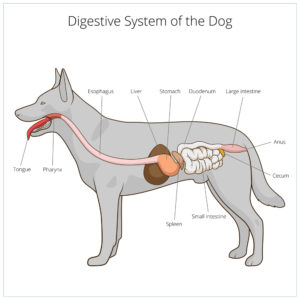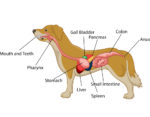 Digestive system is a complex system and when running correctly it is very effective in processing food to feed the body and to getting rid of waste food out of the body. Digestion is defined as the process where food is broken down ready to be absorbed into the bloodstream and distributed around the body.
Digestive system is a complex system and when running correctly it is very effective in processing food to feed the body and to getting rid of waste food out of the body. Digestion is defined as the process where food is broken down ready to be absorbed into the bloodstream and distributed around the body.
Food enters the digestive system through the mouth where it is broken down into small pieces as its chewed before swallowing and then the food passes through the oesophagus Into the stomach and the small intestine where it is digested and the food is absorbed into the bloodstream in the small intestine. The small intestine has a large surface area as it is covered in very small finger-like villi which stick out to give a large surface area. They are very thin, just one cell thick to allow nutrients to pass through the bloodstream quickly.
Excess water is absorbed back into the body in the large intestine. Any undigested food passes out of the body through the anus.
The liver and pancreas play an important part in the digestion process as the Liver produces bile which helps in digesting fats and oils. The pancreas produces biological catalysts called digestive enzymes which are used to speed up the digestive process.
Enzymes are not living things, they are a special protein which is able to break large molecules into small molecules and there are many different types of enzyme which can break down different nutrients.
Carbohydrate enzymes break starch down into sugar.
Lipase enzymes are used to turn fats and oils into fatty acids and glycerol. Digestion of fat is helped by bile that is made in the liver. Bile breaks fat into small droplets that make it easier for the lipase enzymes to work. The bile itself is not an enzyme.
Protease enzymes are used to break down proteins into amino acids. Digestion of proteins is assisted by the acid in the stomach which also helps to kill micro-organisms that may be in the food.
Vitamin, minerals and water are already small enough to be absorbed by the body without having to be broken down by the digestive process.
The only thing the body cannot digest is dietary fibre which is passed out of the body. Fibre is important to encourage digestive transit through the body.
There are lots of bacteria in the digestive system and about half the dry weight of faeces consists of bacteria. Bacteria are important as they digest substances that cannot be digested such as certain carbohydrates, they produce some vitamins such as vitamin K and B and they reduce the chance of harmful bacteria multiplying which may cause disease.


Pingback: Dog microchipping in England is compulsory from April 2016
Pingback: Processionary caterpillars are something that can be fatal to animals
Pingback: Car accidents involving an animal and the law in treating animals
Pingback: Fly strike is a dangerous condition where a fly lays its eggs on an animal
Pingback: Rabies - Pet First Aid Wiki
Pingback: Why is pet food important for a healthy diet for dogs and cats
Pingback: Vaccinations against a combination of several viruses and some bacteria.